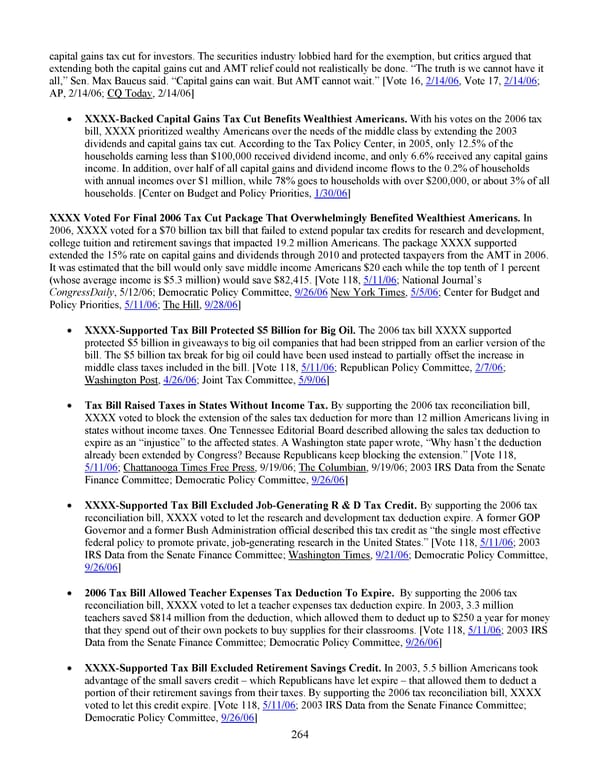capital gains tax cut for investors. The securities industry lobbied hard for the exemption, but critics argued that extending both the capital gains cut and AMT relief could not realistically be done. “The truth is we cannot have it all,” Sen. Max Baucus said. “Capital gains can wait. But AMT cannot wait.” [Vote 16, 2/14/06, Vote 17, 2/14/06; AP, 2/14/06; CQ Today, 2/14/06] XXXX-Backed Capital Gains Tax Cut Benefits Wealthiest Americans. With his votes on the 2006 tax bill, XXXX prioritized wealthy Americans over the needs of the middle class by extending the 2003 dividends and capital gains tax cut. According to the Tax Policy Center, in 2005, only 12.5% of the households earning less than $100,000 received dividend income, and only 6.6% received any capital gains income. In addition, over half of all capital gains and dividend income flows to the 0.2% of households with annual incomes over $1 million, while 78% goes to households with over $200,000, or about 3% of all households. [Center on Budget and Policy Priorities, 1/30/06] XXXX Voted For Final 2006 Tax Cut Package That Overwhelmingly Benefited Wealthiest Americans. In 2006, XXXX voted for a $70 billion tax bill that failed to extend popular tax credits for research and development, college tuition and retirement savings that impacted 19.2 million Americans. The package XXXX supported extended the 15% rate on capital gains and dividends through 2010 and protected taxpayers from the AMT in 2006. It was estimated that the bill would only save middle income Americans $20 each while the top tenth of 1 percent (whose average income is $5.3 million) would save $82,415. [Vote 118, 5/11/06; National Journal’s CongressDaily, 5/12/06; Democratic Policy Committee, 9/26/06 New York Times, 5/5/06; Center for Budget and Policy Priorities, 5/11/06; The Hill, 9/28/06] XXXX-Supported Tax Bill Protected $5 Billion for Big Oil. The 2006 tax bill XXXX supported protected $5 billion in giveaways to big oil companies that had been stripped from an earlier version of the bill. The $5 billion tax break for big oil could have been used instead to partially offset the increase in middle class taxes included in the bill. [Vote 118, 5/11/06; Republican Policy Committee, 2/7/06; Washington Post, 4/26/06; Joint Tax Committee, 5/9/06] Tax Bill Raised Taxes in States Without Income Tax. By supporting the 2006 tax reconciliation bill, XXXX voted to block the extension of the sales tax deduction for more than 12 million Americans living in states without income taxes. One Tennessee Editorial Board described allowing the sales tax deduction to expire as an “injustice” to the affected states. A Washington state paper wrote, “Why hasn’t the deduction already been extended by Congress? Because Republicans keep blocking the extension.” [Vote 118, 5/11/06; Chattanooga Times Free Press, 9/19/06; The Columbian, 9/19/06; 2003 IRS Data from the Senate Finance Committee; Democratic Policy Committee, 9/26/06] XXXX-Supported Tax Bill Excluded Job-Generating R & D Tax Credit. By supporting the 2006 tax reconciliation bill, XXXX voted to let the research and development tax deduction expire. A former GOP Governor and a former Bush Administration official described this tax credit as “the single most effective federal policy to promote private, job-generating research in the United States.” [Vote 118, 5/11/06; 2003 IRS Data from the Senate Finance Committee; Washington Times, 9/21/06; Democratic Policy Committee, 9/26/06] 2006 Tax Bill Allowed Teacher Expenses Tax Deduction To Expire. By supporting the 2006 tax reconciliation bill, XXXX voted to let a teacher expenses tax deduction expire. In 2003, 3.3 million teachers saved $814 million from the deduction, which allowed them to deduct up to $250 a year for money that they spend out of their own pockets to buy supplies for their classrooms. [Vote 118, 5/11/06; 2003 IRS Data from the Senate Finance Committee; Democratic Policy Committee, 9/26/06] XXXX-Supported Tax Bill Excluded Retirement Savings Credit. In 2003, 5.5 billion Americans took advantage of the small savers credit – which Republicans have let expire – that allowed them to deduct a portion of their retirement savings from their taxes. By supporting the 2006 tax reconciliation bill, XXXX voted to let this credit expire. [Vote 118, 5/11/06; 2003 IRS Data from the Senate Finance Committee; Democratic Policy Committee, 9/26/06] 264
 HRC vote skeleton Page 285 Page 287
HRC vote skeleton Page 285 Page 287